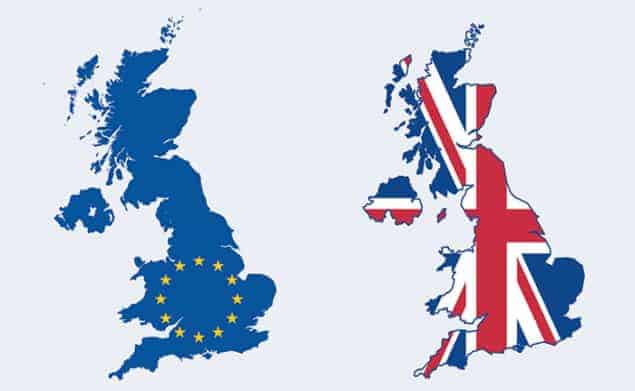
On Thursday 23 June voters in the UK will go to the polls. Not to elect a new government but to decide whether or not the country wishes to remain a member of the European Union (EU) – the supranational alliance of which it has played a fundamental part since 1973. An exit from the EU – dubbed “Brexit” – would profoundly affect many aspects of life in the UK from trade and commerce to travel and security. But what would it mean for physicists working in academia or industry, whether in the UK or elsewhere in Europe?
The official question facing voters on the referendum ballot paper is disarmingly simple: “Should the United Kingdom remain a member of the European Union or leave the European Union?” If the UK votes to leave, under Article 50 of the EU’s governing Lisbon Treaty, once the UK has notified the European Council – the body that defines the EU’s overall political direction – of its intention, the remaining 27 member states would have up to two years to decide on the arrangements for the withdrawal. This would include the details of the UK’s future relationship with the EU. And then the UK would be out.
Quite what the UK’s future relationship with the EU would look like is difficult to predict. No member state has ever left the union, which means that the current arrangements for withdrawal have yet to be tried and tested. Greenland did quit the European Economic Community – the EU’s predecessor – in 1985, but this sets little precedent for a full Brexit. And because the nature of any future relationship between the UK and the EU would be determined by the remaining member states, the extent to which the UK would be able to influence these negotiations is unclear.
Physicists will decide which way to vote based on more than just their experience as scientists, which is why the Institute of Physics (IOP), which publishes Physics World, decided earlier this year not to advise its members how to vote, instead seeking to keep physicists informed about the debate. In April it therefore published a briefing note with data on the impact of the EU on UK physics and also submitted evidence to an inquiry by the House of Lords Science and Technology Committee into the matter.
“We believe this evidence shows that to ensure the continued strength and success of UK physics in the event of a vote to leave the EU, priority must be given to ensuring that current collaborations and access to facilities across the EU are preserved; mitigating any reductions in funding, including (but not limited to) UK-based European facilities; and enabling UK physicists to continue to work with and recruit the best physicists, wherever they come from,” the IOP said in a statement.
The Lords committee, which received evidence from more than 110 universities, individuals, trade organizations and learned societies, concluded in April that the “overwhelming balance of opinion” favoured remaining in the EU. “The ease with which talented researchers can move between EU member states and the UK, the EU’s fertile environment for research collaboration, harmonized regulations, access to EU research facilities and the availability of substantial funding for research combine to make EU membership a highly prized feature of the research ecosystem in the UK,” the report states.
Speaking at a Royal Society debate on the EU last month, however, the science journalist and Conservative peer Matt Ridley criticized the EU. He pointed to a number of EU directives that have made it hard for researchers to do science and to the success of lobby groups regardless of the scientific evidence. “Brussels is not very good at evidence-based policy making, but it’s great at policy-based evidence making,” says Ridley, who is also a member of the Lords Science and Technology Committee.
Numbers game
In terms of hard numbers, the UK is an overall net contributor to the EU budget. From 2007 to 2013 the UK gave €77.7bn to the EU – representing 10.5% of member states’ contribution – and received back €47.5bn (some 6% of the total). In research spending, however, the UK’s Office for National Statistics estimates that the UK contributed €5.4bn between 2007 and 2013 and received back €8.8bn, an overall gain. Per year that figure is only about 3% of the UK’s annual R&D expenditure across industry and academia, which stood at £30.6bn in 2014.
When it comes to winning grants from the EU Seventh Framework Programme, which ran from 2007 to 2013, scientists in the UK came seventh overall, with a success rate of 22.6%. Over the same period, researchers from the UK won €1.7bn in grants from the European Research Council – 22.4% of the total and more than any other nation. They were also top dogs in getting Marie Skłodowska-Curie Actions – awards that enable researchers to work in different countries, sectors or disciplines. UK researchers received about €1.1bn, or 25.5% of the programme’s total budget in that time. According to the Higher Education Statistics Agency (HESA), meanwhile, UK physics departments received £285m in grant funding in 2013/2014, of which about 18% (some £50m) came from the EU.

A UK exit from the EU would not necessarily mean the loss of EU research funding. It may even be possible for the UK to sign up as an “associated country” to the European Research Area (ERA) as Israel, Norway, Switzerland and 10 other countries have done. This would require the UK to pay a proportion of its gross domestic product (GDP) towards the EU research budget, in return for which it would be allowed to compete for funding on a par with EU member states. Terms are negotiated individually with each member and have in the past been tied to freedom of movement for EU citizens.
Associate members do not, however, get a say in determining the priorities or the budget for the EU research programme and it is not clear if associate member status would be open to a large nation such as the UK. “The loss of ability to shape EU policy would be a huge blow to UK science, whether we manage to obtain associate member status or not,” says a spokesperson for Scientists for EU – a group advised by scientists including the University of Cambridge cosmologist Martin Rees and Julia King, vice-chancellor of Aston University. “Even achieving full associate member status would be difficult given our size on the programme and priorities of those who wish us to leave the EU.”
Chris Leigh from Scientists for Britain – a group that supports the leave campaign – takes a different view. “It’s frankly absurd to suggest that a country with Europe’s strongest scientific and academic base would not be welcome in the ERA,” says Leigh, who is an astronomer at Liverpool John Moores University. The group counts among its advisers Julia Reid, a member of the European Parliament for the UK Independence Party, and Jamie Martin, a former special adviser to justice secretary Michael Gove. Leigh also suggests that if the UK left the EU, the UK government could divert some of the money saved from its EU contributions to fund any resulting shortfall in research funding.
Access all areas
A UK exit from the EU is, however, unlikely to spell the end of the country’s involvement in some of the world’s largest physics research facilities. CERN, for example, receives 90% of its funding from its 22 member nations, of which three are non-EU member states. The UK contributed €126m in 2014 and could continue to do so regardless of its EU membership status. The same goes for the European Southern Observatory (ESO), which consists of 16 nations, two of which – Switzerland and Brazil – are not in the EU. In 2014 the UK contributed €22m – or 15.7% – of the ESO’s total funding.
Continued participation in other international partnerships could be more complicated. The ITER nuclear-fusion project, for example, is a collaboration between China, the EU, India, Japan, Korea, Russia and the US. The EU contributes 45% of the project’s total funding, with other partners paying 9% each. And while the European Space Agency (ESA) is an independent intergovernmental organization, it maintains close ties with the EU. ESA receives 73% of its €5.25bn annual funding from its 22 member countries – the UK pays €325m – with a further 25% from the EU. ESA and the EU operate a joint European Space Policy and programmes such as the Galileo global navigation system.
As for the impact of a UK exit from the EU on international collaboration and researcher mobility, according to HESA, some 14% of research and teaching staff in UK university departments are from non-UK EU countries. In physics departments, this figure rises to an average of 24%, although in some departments up to 50% of staff come from elsewhere in the EU. Nearly one in five publications in the physical sciences submitted in 2014 to the UK’s Research Excellence Framework – a programme used to allocate funding to university departments – had an EU collaborator. And more than 55% of UK publications between 2008 and 2014 had foreign co-authors, with four of the top five collaborative countries being EU member states.
Those in favour of Brexit point out that the UK would not want to close borders to scientists from around the world. In the absence of some kind of freedom of movement agreement, however, EU researchers would be subject to the same entry rules and visa requirements as researchers from elsewhere in the world. And this makes it more likely, says Universities UK – a body that represents the UK’s universities – that EU researchers would choose to go elsewhere.
Another issue for physicists is the impact that leaving or remaining in the EU could have on international students coming to the UK. Non-UK EU students currently make up 5% of all students at UK universities and 17% of physics PhD students. EU students are treated as UK students for funding purposes, meaning that they are charged annual “home” fees of up to £9000, rather than the £18,000 or more paid by students from outside the EU.
If the UK were to leave the EU, recruitment of EU students could be more complicated and more expensive, especially if such students were subject to the same visa regulations that apply to overseas students. But as EU students would then fall outside the tuition-fee and student-number controls used to restrict the number of EU students in some subject areas, such as medicine, universities could recruit more EU students and charge them higher fees.
For the IOP, though, the message to the UK government is clear. “Science is a long-term, collaborative endeavour, and we acknowledge the uncertainty that holding the referendum is creating in some international science partnerships,” the IOP says. “Whatever the outcome of the referendum, we would wish to see this uncertainty dealt with through a clear commitment from the UK government to ensuring long-term stability for UK science and for those with whom we collaborate.”
- This article was first published in the June 2016 issue of Physics World. Enjoy the rest of the latest issue in our digital app for desktop browsers, iOS or Android. Membership of the Institute of Physics required



